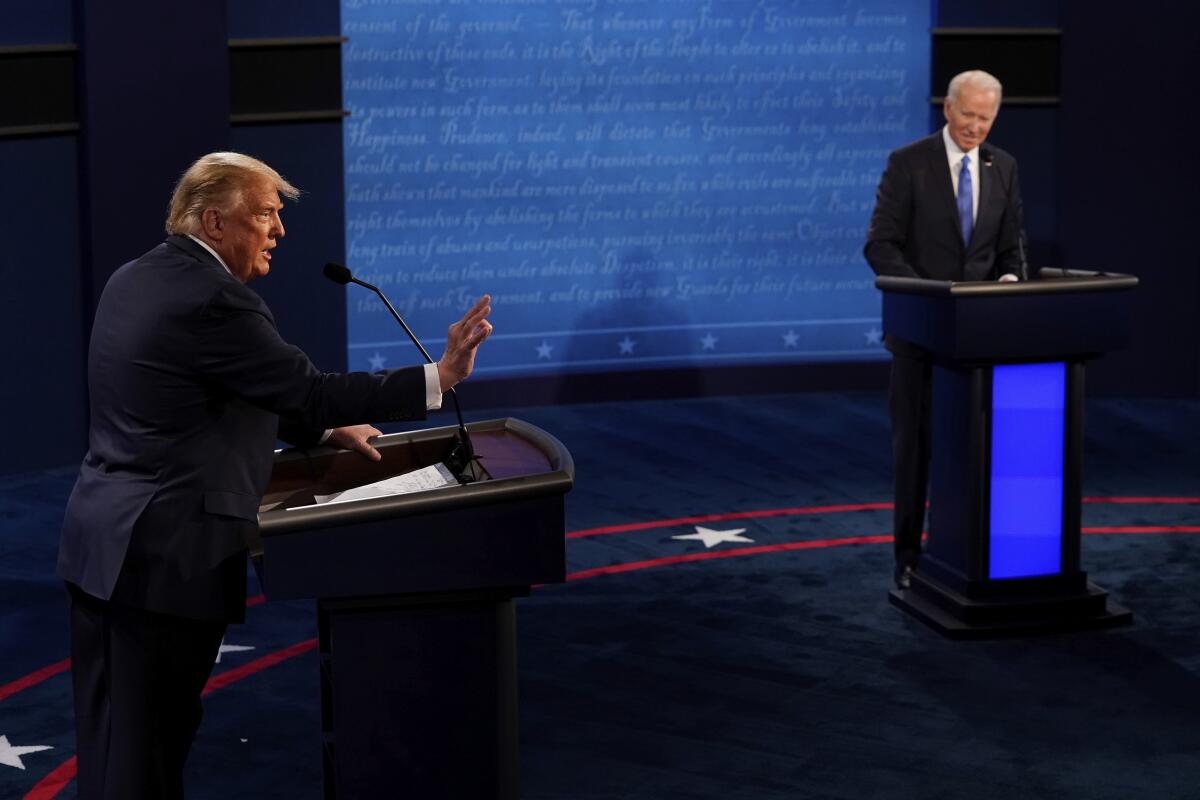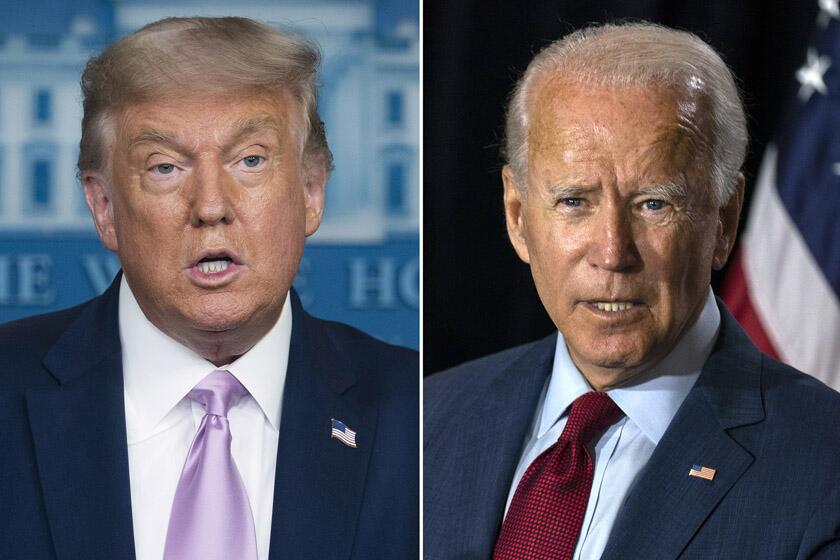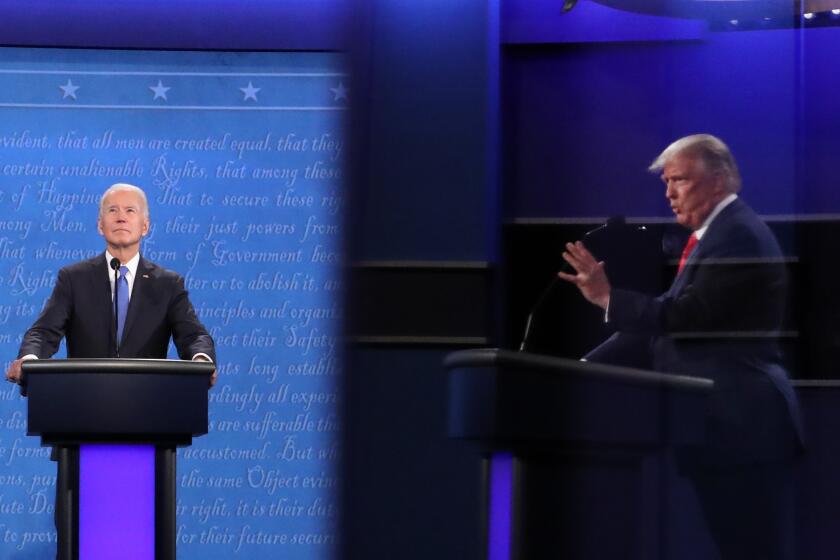Key takeaways from the second and final Trump-Biden debate

If you’re one of more than 52 million Americans who have already cast your presidential ballot, not to worry.
Though they managed to behave better than in their last raucous debate — a mute button helped — nothing that President Trump or Democratic challenger Joe Biden said or did onstage Thursday night seems likely to change a great many minds.
Coming just 12 days before election day — or what might be more accurately called the voting cutoff — the mostly tame 90-minute session presented Trump his last best chance before a national audience to change the trajectory of a race he seems to be losing.
President Trump and former Vice President Joe Biden met for their second and final debate 12 days before election day.
It will take at least a few days for the impact, if any, of Thursday night’s socially distanced scrap in Nashville to become clear. Meantime, here are some key takeaways:
Trump tones down
The president’s strategy in the first debate was to never let Biden, or moderator Chris Wallace, squeeze a word in edgewise. He thought it was a terrific success; many others, including some of his staunchest supporters, did not.
This time, it was the tale of two Trumps.
At the start, the president largely reined in his combative impulses. He interrupted less, spoke softly and even sprinkled in a few niceties toward Kristen Welker, the debate moderator, whom he had been attacking in recent days. But the president’s more familiar instincts ultimately resurfaced.
President Trump and former Vice President Joe Biden faced off in the second and final 2020 presidential debate Thursday night in Nashville.
He ran through the greatest hits of his Twitter feed — falsely claiming he was subject to a years-long “phony witch hunt” involving Russian interference in the 2016 campaign, groundlessly accusing the Obama administration of spying on his campaign.
Having recovered from COVID-19, he seemed none the worse for wear, growing more animated as the evening went on.
One constant throughout: the president’s tenuous relationship with the truth. Fact-checkers were kept busy with his claims of an imminent coronavirus vaccine, his exaggerated toughness toward Russia and other whoppers.
Biden holds his own
Biden didn’t suffer a brain freeze or open his mouth and spray buckshot into his feet. Indeed, he more than acquitted himself.
Trump has consistently sought to disqualify the former vice president by painting him as too old, even though a mere three years separate the 74-year-old president and Biden, who is 77. The strategy counts on help from the Democrat, who has a longtime penchant for mangling his words. That, in theory, would illustrate the case Biden was long past his sell-by date.
It didn’t happen in the first debate. It didn’t happen in the second, either.
Crisp speaking, cogent argument and linear presentation have never been the former vice president’s strong suit. There were long and winding answers. There was the occasional far-fetched claim, like an extraordinarily high projection of COVID-19 deaths that appeared rooted less in fact than hyperbole. There was garble and a verbal stumble now and then.
After the debate, Biden felt obliged to clarify his statement calling for a “transition” away from the oil industry in favor of renewable energy. Trump called that a job-killer and urged voters in oil-producing states to take note; Biden said he merely supports an end to government subsidies for fossil fuels.
But the night produced nothing remotely close to a death blow to Biden’s candidacy.
Night and day on COVID-19
When it came to the coronavirus that has ravaged the country and tanked the economy, the differences between the candidates were as stark as black and white, night and day, or a fairy tale vs. a pathology report.
More than 223,000 Americans have died of COVID-19 and the country is now experiencing its third surge of the pandemic, with cases exploding and some states reporting record infection and hospitalizations.
Still, Trump persisted in minimizing the ravages of the onslaught, praising his handling of the deadly virus, promising the speedy delivery of a vaccine — despite what scientists say — and suggesting the worst is past.
“We’re rounding the corner,” he said contrary to the evidence. “It’s going away.”
A grim-faced Biden had none of it.
“Anyone that is responsible for that many deaths should not be president of the United States,” he said bluntly, adding later, “We are about to go into a dark winter. A dark winter.”
Let’s clear some things up
Trump often gets questions where a simple yes or no would suffice: Will you renounce white supremacists? Will you accept the results of the election? Do you reject QAnon, which perpetuates a wacky theory that Democrats are cannibalistic child traffickers?
Usually, the president offers caveat-loaded or grudging answers that inspire more confusion than clarity. On Thursday night, Trump again had the chance to address racially inflammatory rhetoric, such as sharing video of a supporter shouting “White power!”
His wordy response once more stopped short of an unequivocal denouncement.
After criticizing Black Lives Matter groups for anti-police chants, he vouched for his own nonracist bona fides. “I am the least racist person in this room,” he said multiple times. Pressed by Welker on why some people see him as inciting more racial strife, Trump seemed flummoxed.
Biden countered that Trump was “one of the most racist presidents we’ve had in modern history,” sarcastically calling him Abraham Lincoln in a derisive reference to Trump’s claim he has done more for Black Americans than any president since Lincoln ended slavery.
He cited Trump’s racist comments about Mexicans, his efforts to ban Muslims from the country and his “stand by” call to the extremist group Proud Boys — whom Biden wrongly called “Poor Boys.”
“This guy,” Biden jibed, “has a dogwhistle about as big as a foghorn.”
Family feud
Biden’s son, Hunter, has lurked on the fringes throughout the campaign. His business dealings in Ukraine, and unfounded charges that his father used his power as vice president to help him, were at the heart of the impeachment case against Trump.
In recent days, the president and his allies sought to shove Hunter Biden front and center, seizing on a sketchy report in the pro-Trump New York Post to assert the former vice president used his office to promote his son’s business interests in China.
On Thursday night, Trump repeatedly raised those allegations of self-dealing and corruption, accusing Biden and his family of enriching themselves to the tune of millions of dollars in dealings with Russia, China and Iran. “Malarkey,” Biden responded, saying, “I have not taken a penny from any foreign source ever in my life.”
When Trump persisted, Biden accused Trump of purposely trying to distract from the kitchen-table issues that voters care about it. “We should be talking about your family,” he said, looking earnestly into the camera.
“Typical politician,” Trump scoffed. “C’mon Joe, you can do better.”
A look at where President Trump and Joe Biden stand on key issues in the 2020 election, including healthcare, immigration, police reform and climate.
Immigration, at last
Trump’s signature issue has been immigration and his policies have been some of the most controversial of his presidency. Yet the topic has been notably absent from much of the campaign dialogue, until Thursday night.
Trump was pressed on recent news that his administration cannot locate the parents of 545 children who were separated from their families at the U.S. border with Mexico, part of a strategy to deter immigrants from entering the country illegally. Trump was vague on efforts to reunite these families, blaming Biden for the detention policy
“They built the cages,” Trump said of Biden and President Obama, referring to temporary enclosures to hold unaccompanied minors. He insisted the children “are so well taken care of. They’re in facilities that are so clean.”
“They separated them from their parents,” Biden shot back. “It makes us a laughingstock and violates every notion of who we are as a nation.”
The mute button worked
Welker, NBC’s White House correspondent, faced a difficult task trying to avoid a repeat of the last debate, which proved as decorous and edifying as a 2-year-old’s tantrum.
She largely succeeded.
One important weapon was a mute button, agreed upon by the bipartisan commission overseeing the debate, which silenced the candidates during a two-minute period whenever a new topic was introduced.
It also helped that a far more subdued Trump showed up. While his exasperation was clear in split-screen moments where Biden spoke — frowning, a look of skepticism or disbelief passing over his face — he largely waited his turn and was notably courteous to Welker; he lifted a finger, or politely raised his hand to signal a wish to respond, displaying a kind of politesse — “excuse me,” “thank you” — notably absent the last time.
“I respect very much the way you are handling this,” Trump said at one point.
For his part, Biden laughed, grimaced, shook his head and sometimes theatrically gaped at Trump. But he largely waited his turn to have a say and even allowed his rival more than once to have the final word — no small feat for the famously loquacious Biden.
It might not have changed a whole lot of votes. But at least it wasn’t painful to watch.
More to Read
Get the L.A. Times Politics newsletter
Deeply reported insights into legislation, politics and policy from Sacramento, Washington and beyond. In your inbox three times per week.
You may occasionally receive promotional content from the Los Angeles Times.














